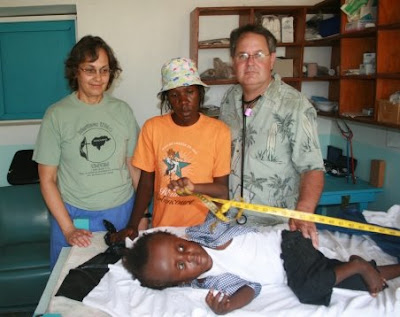
I'm reading a book most would not rush to Amazon to find, but interprets Second Isaiah and speaks of fantasy and hope as different than reality. The returning Jews had a dream or vision of the long remembered Jerusalem as golden city, yet the reality was a temple in ruin and a powerless society far removed from the fantasy.
As we dream for Haiti AND with the people of sud la gonave, our presence gives them a hope that we try to temper with reality. The vision and understanding of the United States is to them a fantasy that to us is a reality they don't want to acknowledge. The few hundred dollars received from family in the US is a fortune indicating life there is exceedingly lucrative.
A novice UM pastor recently visited Ansagale and mentioned to the pastor there, he planned to help them "when he got settled into his new appointment." Now I am attempting to explain the 200 students and families who have been told education costs will be paid for the coming year ($40,000.00 US) plus teacher salaries and daily meals is a dream that will not happen! The reality of a well intended promise triggered a fantasy out of desperation.
Kansas has been massing UMCOR Birthing Kits for me since I blurbed my surprising experience of delivering a baby in Sousafilip for the first time, sans the basic "nursing" supplies.
I will be passing out over 200 birthing kits at a Methodist Women's conference July 2nd with hopes they will make it into the hands of pregnant women to have available at delivery time. That may be a fantasy contents may be used or sold before due date.
The last few days two powerful local leaders have been at war and one old, very poor man has become the pawn in the middle of the chess board. Given permission to plant melons by one the other has pulled up half the garden, causing hysteria of the gardener and polarization of the community. Many have come to us as we represent authority (unrealistically) and are disappointed when we refuse to be drawn into the fight of these two decades old enemies.
We meet today with AAPLAG, a Haitian Agency, formerly uninvited to help with development on sud la gonave. We have planned an initial training program for leadership organization, agriculture, animal husbandry and fishing co-operative. AAPLAG is excited about being invited after 25 years to help one of the poorest areas in Haiti, and there is excitement in many communities about access to information and training long denied. The other side of the coin? Resistance by the self appointed power faction who prefer the disparity of power and poor. We pray ours is not an unrealistic vision.
The book I'm reading suggests the understanding of Jesus role or power was the result of liturgy from early Judaism, finally fused into the servant and shepard characteristics of the Messiah. Powerlessness most powerful when persistent and thinking beyond the restoration of of one nation but "all of creation."
Living and working in a poor and powerless culture creates a desire to dream or vision changes that may be based more on guilt and compassion that reality and rationalism. Tempted to offer a means of power clouds ones vision of Christ we feel we were called to mission to see.
Mother Theresa saw Christ in the face of the dying poor and abandoned. I would rather see Jesus in the face of the well fed, clothed, sitting on a nice front porch sipping safe water and having a mid day healthy snack!
Facing the reality of a world of greed that uses and abuses; of technology that creates games to play costing more than two thirds of the world lives on a year; and, the powerless, once made powerful will probably become also corrupt and greedy, I find I'm drawn to the books outlook.
It isn't power that will change or improve life but persistence. Persistent expectation that all are important but life is far more rewarding for those who serve and those who lead with gentleness and compassion. A persistent understanding that the power of God is displayed more in shared responsibility and solidarity, one with another and one with creation, and thinking beyond Haiti. Shirley





